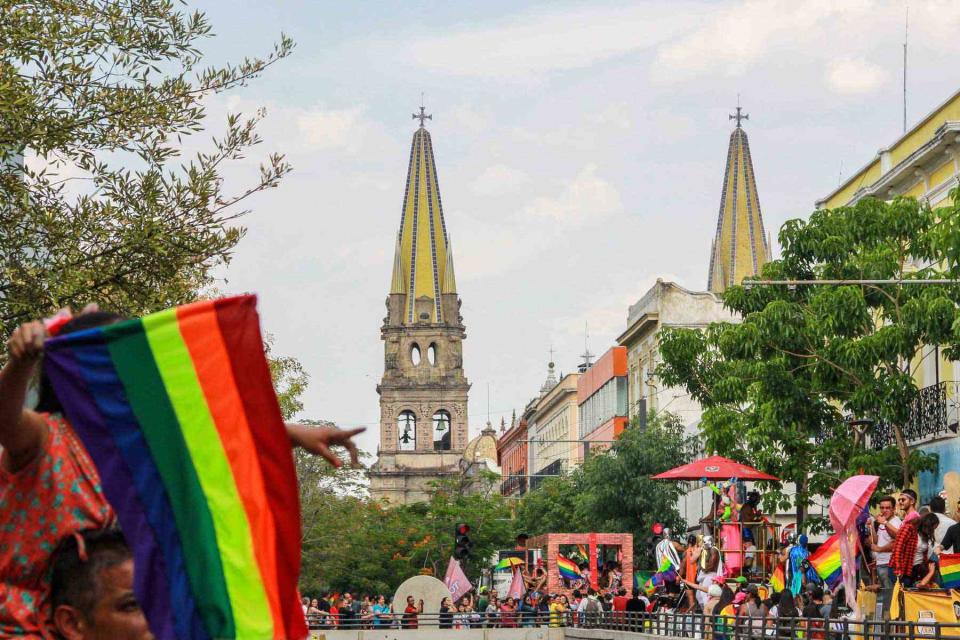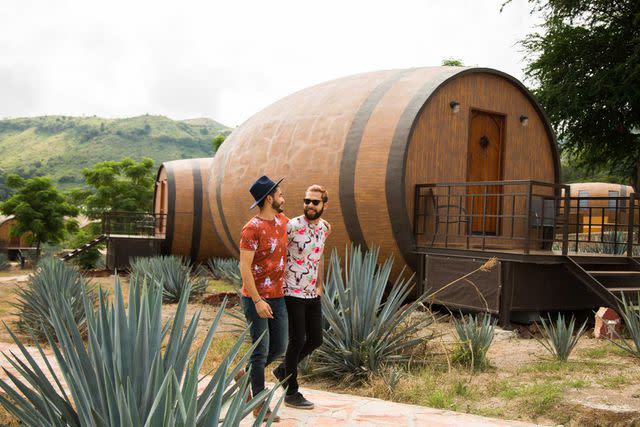This Mexican Destination Is One of the Most Progressive in Latin America Thanks to Its Game-changing LGBTQ+ Initiatives
In Jalisco, a richly realized LGBTQ+ movement goes beyond the beaches of Puerto Vallarta.

Courtesy of Guadalajara Tourism Board
Revelers at the pride parade in Guadalajara.Among many queer travelers, Jalisco is a well-known Mexican destination, thanks in large part to the immense popularity of the resort town of Puerto Vallarta, which has enjoyed the patronage of LGTBQ+ visitors for many years. But there’s much more to this 30,347-square-mile state — an honoree in Travel + Leisure's 2023 Global Vision Awards — than Puerto Vallarta’s LGTBQ+ beaches, hotels, and parties. And this year, as its capital Guadalajara gears up to cohost the 2023 Gay Games, many of Jalisco’s LGBTQ+ leaders are working to highlight game-changing initiatives that have made the state one of the most progressive in Latin America.
This has been an especially important movement in Guadalajara. "For over 40 years, the city has worked toward becoming a more inclusive place," says Andrés Treviño, who, in 2018, became Jalisco’s sexual diversity director, adding that, historically, just like many other places, Guadalajara wasn’t very open to diversity and LGBTQ+ people were under the threat of police harassment. The last four decades have seen an LGBTQ+ community galvanized to improve their lives and stature in society. And through November of last year, an exhibit called "40 Años de Visibilidad," (or "40 Years of Visibility") surveyed this journey with installations, artworks, and other content (from the first gay magazines to paraphernalia from the city’s drag scene) that celebrate momentous occasions in this movement for equality.
Foreigners might not be as familiar with LGBTQ+ culture in Guadalajara. But for Mexicans, its queerness was a well-known fact. In the 1980s and 1990s, the city was home to some of the country’s biggest and most important LGBTQ+ nightlife venues. There’s Monica’s, which first opened as a clandestine gay bar in 1980 (the first openly gay club in the city). Its popularity was so immense that, at its peak, it gathered 3,500 people every night. It wasn’t just a club; it became a culture touchpoint not just for Guadalajara, but for all of Mexico. "Back in the day, the borders were closed to a lot of entertainment. There was a gap between what was culturally happening in the U.S. and Mexico,” explains Treviño. "So, Monica’s owner would drive to Los Angeles to bring back the newest music, the newest drag performance, and that made it a truly iconic place.”

Courtesy of Guadalajara Tourism Board
The Matices Hotel de Barricas, in Tequila, is among the LGBTQ-friendly properties in Jalisco.To commemorate this legacy, a public initiative called Revolución al Rojo is campaigning for Monica’s original doors to be installed as a monument at Parque Revolución as an homage to Guadalajara’s LGBTQ+ history. But the work that’s been decades in the making in Guadalajara has had lasting impact throughout Jalisco. Even the role Treviño occupies, which focuses on expanding sexual diversity and equality in the state, doesn’t exist anywhere else in Mexico. And it's this office that has helped propel landmark rulings in favor of LGBTQ+ people. For example, in October 2020, Jalisco signed into law that a trans person of any age can change the gender identity on their legal IDs, including birth certificates. Jalisco is the only Latin American territory where this is possible. And for Jalisco, where LGBTQ+ visibility is already happening via Pride events in destinations both big and small, being able to host events like the Gay Games in Guadalajara is a major step toward true equality and inclusion.
"We cannot just call the state or government inclusive without recognizing the past. And 30 years ago, the government was promoting discrimination. So, they have to provide a statement that recognizes that was a mistake and that they’re perspective has changed,” Treviño adds. “The Gay Games are a measure to repair that damage, as well as a path to the future. If young folks come out to the streets and see it full of rainbows and people being free, it can change the way queer people are perceived."
The Travel + Leisure Global Vision Awards aim to identify and honor companies, individuals, destinations, and organizations taking strides to develop more sustainable and responsible travel products, practices, and experiences. Not only are they demonstrating thought leadership and creative problem-solving, they are taking actionable, quantifiable steps to protect communities and environments around the world. What's more, they are inspiring their industry colleagues and travelers to do their part.
For more Travel & Leisure news, make sure to sign up for our newsletter!
Read the original article on Travel & Leisure.

